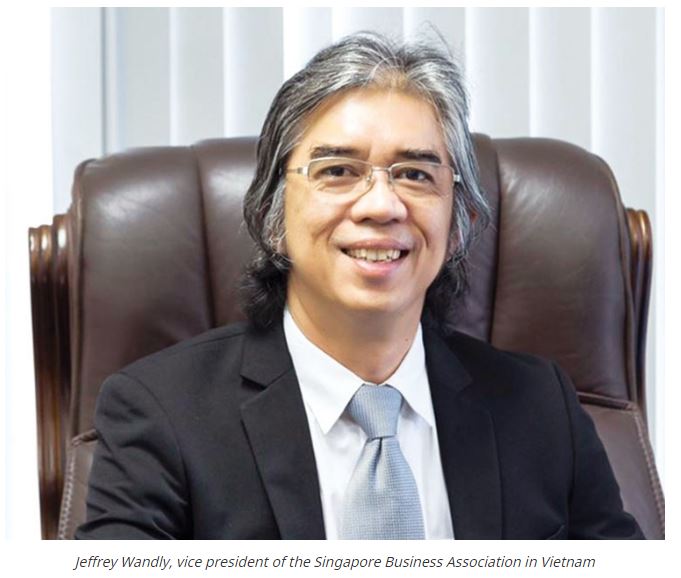Singaporean business surges ahead
Singaporean business and investment in Vietnam has increased significantly over the decades, thus greatly contributing to strengthening economic bilateral ties.
Jeffrey Wandly, vice president of the Singapore Business Association in Vietnam, talked about new Singaporean moves and how legal improvements reinforce the trend.
A number of foreign investors have made a shift towards Vietnam. Have you seen similar moves among Singaporean companies, and what will these new trends consist of?
Singapore is one of the largest investors here this year so far at nearly $6.44 billion, accounting for 34.1 per cent of the Southeast Asian country’s total foreign investment during the period, according to statistics from the Ministry of Planning and Investment. In recent times, we have seen some Singaporean investors moving into Vietnam, such as Blue Circle SHS Holdings and Sinergy Holdings in manufacturing and processing; and in the consumer sector there has been Koda Ltd., Kwan Brothers Pte., Ltd., and NTUC Fairprice Co-Operative Ltd. In addition, technology and engineering moves have been made by Siasun Automation Pte., Ltd., Singapore Technologies Engineering Ltd., and Delta Offshore Energy Pte Ltd. in the energy realm.
Investment trends in innovation and technology-based businesses, startups, and small- and medium-sized enterprises (SMEs) among others are taking advantage of incentives with a focus on the consumer market, manufacturing, infrastructure, and urban solutions.
Vietnam has worked to make improvements in the legal framework for business and investment. Are these changes enough to further facilitate such activities among Singaporean investors?
The Law on Investment 2020 focuses on technology, innovation and research and development. However, the addition of national security as a criterion for investment review creates some uncertainty as to how far this would encourage or deter foreign investments in sensitive and protected sectors. The minimum investment capital requirement for public-private partnership (PPP) projects is very high and only very large foreign direct investment (FDI) are able to participate in such projects. The draft law currently provides that the minimum investment capital of a PPP project is VND200 billion (approximately $8.7 million). The inclusion of a minimum investment capital sum would be in line with the government’s aim of ensuring that larger PPP projects are prioritised.
This would mean that investors who may be good but comes with limited financial capabilities may not be able to participate in such projects.
Amid stiff competition in the region in FDI attraction. Will the new legislation help Vietnam gain advantage, thus increasing our attraction?
The Law on Investment sets out regulations to facilitate investors in carrying out admin procedures, investment, land and construction, thereby attracting FDI to Vietnam. In comparison with other countries legal frameworks, this new version of the law is broadly in line with other emerging economies in Asia-Pacific.
Introduction of national security conditions are also broadly in line with emerging economies’ concern about rebalancing their degree of openness with new perceptions of national security imperatives, especially regarding data and technology. However, the policy is only preliminary, and there is no explicit guidance on what constitutes “national security” reasons. As for limited liberalisation, there is a narrowing of the scope of projects subject to evaluation and providing greater market access to foreign funders, but many primary and service sectors remain partly off limits to FDI.
Overall, we are optimistic at the positive advancements in the legal and investment framework that Vietnam has worked towards. We can look forward to more cooperations between Vietnam and Singapore.
| Established in 2006, the Singapore-Vietnam Connectivity Ministerial Meeting is an annual platform which has been a cornerstone of bilateral economic relations between Singapore and Vietnam.
Chan Chun Sing, Singaporean Minister for Trade and Industry, and Vietnam’s Minister of Planning and Investment Nguyen Chi Dung are the current co-chairs of the platform. The Connectivity Ministerial Meetings review the progress of the six sectors of cooperation: education and training, finance, IT and telecommunications, investment, trade and services, and transportation on an annual basis. Since its implementation, the meetings have successfully facilitated several private sector projects into Vietnam, including the development of the Vietnam-Singapore Industrial Parks (VSIPs), PSA’s joint venture with Saigon Port to build and operate a deep-sea container terminal in the southern province of Ba Ria-Vung Tau, and the establishment of branch offices by Singaporean banks in Vietnam. The events have also strengthened public sector cooperation in all six sectors. Singaporean agencies have continually organised capacity building programmes for Vietnamese officials in urban development, education, and civil aviation, amongst others. VIR |
Bich Thuy
Source: https://vietnamnet.vn/en/business/singaporean-business-surges-ahead-664068.html


 Thailand
Thailand




